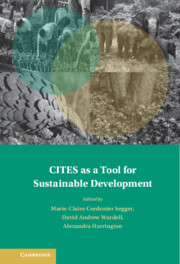Book contents
- CITES as a Tool for Sustainable Development
- Treaty Implementation for Sustainable Development
- CITES as a Tool for Sustainable Development
- Copyright page
- Contents
- Figures
- Tables
- Boxes
- Notes on Contributors
- Preface by CITES Secretary-General, Ivonne Higuero
- Foreword by Honorable Judge Antonio H. Benjamin
- Acknowledgments
- Abbreviations
- Part I Endangered Species, Sustainable Development and the Law
- Part II Sustainable Development in Law and Policy on Endangered Species
- 4 Shifting the Burden of Wildlife Protection: The Role of Extraterritorial Jurisdiction in Implementing CITES
- 5 Analyzing CITES Trade Measures
- 6 The CAFTA–DR Environmental Submission Process as a Public Participation Alternative and a Way to Protect CITES-Listed Species
- Part III Global Implementation of CITES by Key Species/Commodity
- Part IV National Implementation of CITES
- Part V Emerging Issues and Synergies for CITES in the Context of Sustainable Development
- Part VI Conclusions
- Cases and Court Decisions
- CITES Resolutions and Documents
- Domestic Acts and Regulations
- Multilateral Treaties and Declarations
- Recommended Resources
4 - Shifting the Burden of Wildlife Protection: The Role of Extraterritorial Jurisdiction in Implementing CITES
from Part II - Sustainable Development in Law and Policy on Endangered Species
Published online by Cambridge University Press: 27 July 2023
- CITES as a Tool for Sustainable Development
- Treaty Implementation for Sustainable Development
- CITES as a Tool for Sustainable Development
- Copyright page
- Contents
- Figures
- Tables
- Boxes
- Notes on Contributors
- Preface by CITES Secretary-General, Ivonne Higuero
- Foreword by Honorable Judge Antonio H. Benjamin
- Acknowledgments
- Abbreviations
- Part I Endangered Species, Sustainable Development and the Law
- Part II Sustainable Development in Law and Policy on Endangered Species
- 4 Shifting the Burden of Wildlife Protection: The Role of Extraterritorial Jurisdiction in Implementing CITES
- 5 Analyzing CITES Trade Measures
- 6 The CAFTA–DR Environmental Submission Process as a Public Participation Alternative and a Way to Protect CITES-Listed Species
- Part III Global Implementation of CITES by Key Species/Commodity
- Part IV National Implementation of CITES
- Part V Emerging Issues and Synergies for CITES in the Context of Sustainable Development
- Part VI Conclusions
- Cases and Court Decisions
- CITES Resolutions and Documents
- Domestic Acts and Regulations
- Multilateral Treaties and Declarations
- Recommended Resources
Summary
Highlights that addressing biodiversity loss requires more than appropriate laws; it also requires effective enforcement and implementation. However, many of the most biodiverse countries in the world lack the necessary capacity and resources to effectively enforce wildlife protection laws, particularly against increasingly organized and powerful criminal networks. Building the capacity of these countries is an important but incomplete part of a fair and lasting solution; it must be accompanied by action on the part of more developed countries to take responsibility for their role in driving, controlling and perpetrating wildlife crime outside their borders. CITES itself is a landmark agreement in recognizing this responsibility. Countries can fulfil this responsibility by expanding jurisdiction through measures such as trade-based and supply chain regulations and long-arm legislation. These measures can allow more capable countries to take on a larger share of the burden of enforcing wildlife legislation, resulting in more fair, effective and efficient implementation of CITES.
- Type
- Chapter
- Information
- CITES as a Tool for Sustainable Development , pp. 49 - 78Publisher: Cambridge University PressPrint publication year: 2023

